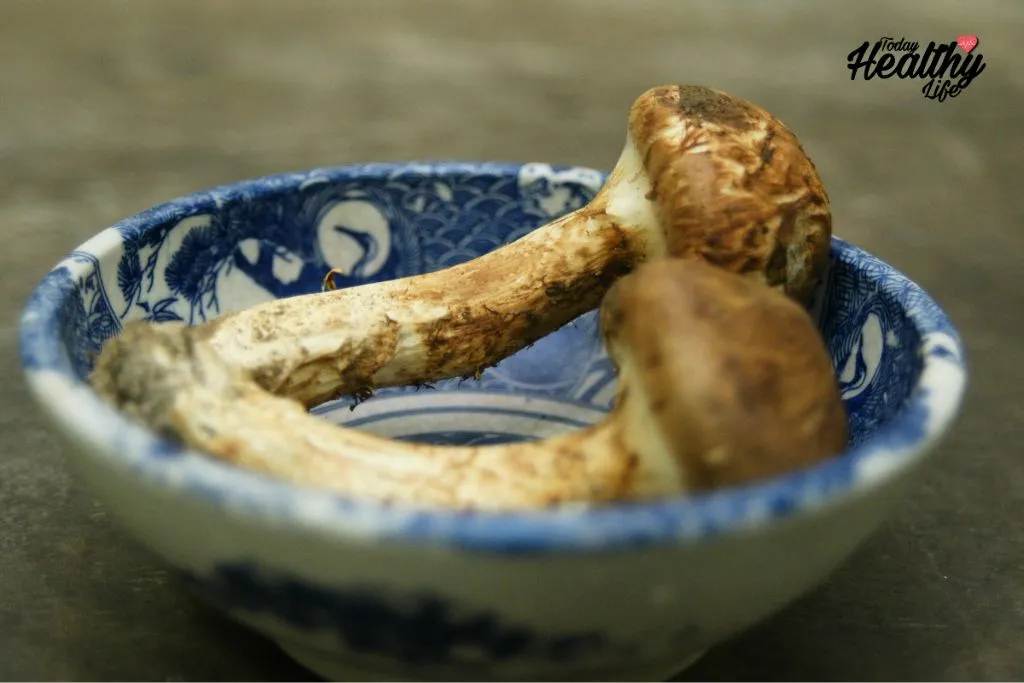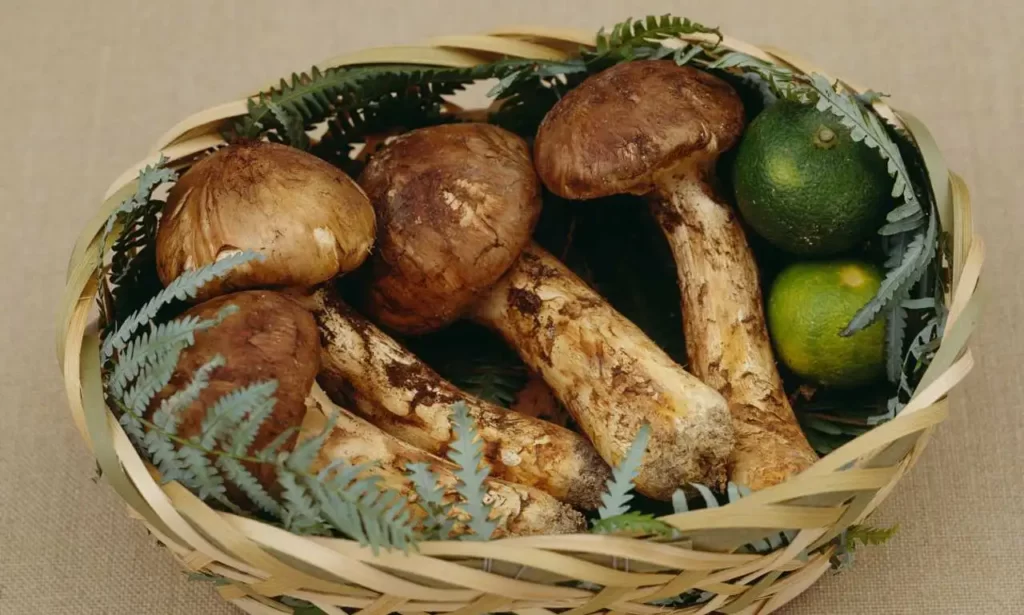Matsutake mushrooms, scientifically known as Tricholoma matsutake, are a highly esteemed wild edible fungus cherished for their distinctive flavor and captivating aroma.
Native to East Asia, these mushrooms have gained international acclaim and are now also cultivated in various regions around the world.
Revered for their culinary and medicinal value, matsutake mushrooms have become a symbol of luxury and refinement in the world of gastronomy.
In this comprehensive guide, we will delve into the various facets of matsutake mushrooms, including their nutritional value, health benefits, uses, reasons for their high price, and cooking methods.

Table of Contents
Nutritional Value of Matsutake Mushrooms
Matsutake mushrooms are not just celebrated for their taste and scent; they also pack a significant nutritional punch.
They are rich in a variety of vitamins, minerals, and dietary fiber, making them a wholesome addition to your diet.
Here is a nutritional chart of 100 grams of matsutake mushrooms:
| Nutrient | Amount |
|---|---|
| Calories | 22 |
| Protein | 3.09 grams |
| Fat | 0.34 grams |
| Carbohydrates | 3.28 grams |
| Fiber | 1.0 grams |
| Sugar | 1.65 grams |
| Sodium | 5 milligrams |
| Potassium | 376 milligrams |
| Vitamin C | 30 milligrams (42% of the DV) |
| Thiamine (vitamin B1) | 0.14 milligrams (11% of the DV) |
| Riboflavin (vitamin B2) | 0.2 milligrams (13% of the DV) |
| Niacin (vitamin B3) | 0.5 milligrams (2% of the DV) |
| Vitamin D | 2.4 micrograms (48% of the DV) |
| Iron | 1.3 milligrams (8% of the DV) |
| Zinc | 0.4 milligrams (4% of the DV) |
| Selenium | 10 micrograms (19% of the DV) |
The nutritional value of matsutake mushrooms can vary depending on the growing conditions and the variety of mushrooms.
Read: Matsutake Mushroom Recipe.
Here are some key nutrients details in matsutake mushrooms:
Vitamins:
- Vitamin C: Matsutake mushrooms are an excellent source of vitamin C, a potent antioxidant that supports the immune system and promotes skin health.
- B-Vitamins: These mushrooms contain notable amounts of vitamin B1 (thiamine) and vitamin B2 (riboflavin), essential for energy production and maintaining healthy skin, eyes, and nerve functions. Smaller amounts of vitamin B3 (niacin) and vitamin D are also present.
Minerals:
- Potassium: Important for maintaining electrolyte balance, heart health, and nerve function.
- Copper: Essential for iron absorption, collagen formation, and overall immune system support.
- Iron and Zinc: Vital for blood health, immune function, and wound healing.
- Selenium: An antioxidant mineral with potential cancer-protective properties.
Dietary Fiber:
- Fiber: Matsutake mushrooms are a notable source of dietary fiber, aiding in digestion, promoting gut health, and preventing constipation.
Also Read: Fox Nuts (Makhana): Benefits, Side Effects, Nutrition, Calories & All.
Health Benefits

The consumption of matsutake mushrooms has been associated with several health benefits, largely owing to their unique bioactive compounds. Some notable advantages include:
1. Immune System Support:
Matsutake mushrooms contain compounds like beta-glucans, terpenoids, and triterpenes that have demonstrated immune-boosting properties.
These compounds help fortify the body’s defenses against infections and illnesses.
2. Anti-Inflammatory Effects:
The anti-inflammatory properties of matsutake mushrooms make them potentially beneficial in reducing inflammation, a root cause of various chronic diseases such as heart disease, cancer, and arthritis.
3. Cancer Protection:
Compounds like lentinan, hericenones, and erinacines found in matsutake mushrooms have shown promising anticancer potential.
These substances are believed to contribute to cancer prevention and may complement conventional treatments.
4. Gut Health Improvement:
With their rich fiber content, matsutake mushrooms can contribute to a healthy gut environment by promoting regular bowel movements, supporting digestion, and fostering a diverse gut microbiota.
5. Cholesterol Management:
The high beta-glucan content in matsutake mushrooms may aid in reducing cholesterol levels, thus benefiting cardiovascular health.
Uses of Matsutake
Matsutake mushrooms, with their captivating aroma and unique flavor, have carved out a special place in various domains beyond the culinary world.
From perfumery to traditional medicine, these remarkable fungi find themselves woven into the fabric of diverse human experiences.
Let’s explore the multifaceted uses of matsutake mushrooms:
1. Culinary Delight: The Gastronomic Experience
Matsutake mushrooms have earned their reputation as a culinary delicacy, celebrated for their intense aroma and distinctive taste.
The rich umami flavor and earthy scent contribute a depth of character that enhances a wide range of dishes.
Here are some ways these mushrooms are used in the culinary realm:
- Stir-Fries and Sauteés: Matsutake mushrooms can be sauteed or stir-fried alongside an array of ingredients, creating dishes that burst with flavor and fragrance.
- Soups and Stews: Their aromatic essence lends depth to broths and stews, enhancing the overall complexity of flavors.
- Grilling and Roasting: Grilled or roasted matsutake mushrooms offer a delightful contrast of textures and a concentrated flavor profile.
- Simple Preparations: Sometimes, the best way to appreciate matsutake mushrooms is by preparing them simply to savor their unique taste and aroma.
- Culinary Artistry: Renowned chefs often feature matsutake mushrooms as star ingredients, crafting exquisite dishes that highlight their exceptional qualities.
2. Perfumery and Fragrance Creation
The captivating aroma of matsutake mushrooms has not gone unnoticed in the world of perfumery.
Their unique scent, reminiscent of the forest floor and the great outdoors, adds a natural and sophisticated dimension to fragrances.
Here’s how matsutake mushrooms are used in perfumery:
- Fragrance Notes: The distinct aroma of matsutake mushrooms can be used as a fragrance note in perfumes, colognes, and other scented products.
- Nature-Inspired Scents: Matsutake’s earthy and woody fragrance contributes to scents that evoke a connection with nature, bringing a sense of tranquility and grounding to perfumes.
3. Traditional Medicine: Healing Properties
Matsutake mushrooms have a longstanding history in traditional Chinese and Japanese medicine, where they are believed to offer various health benefits.
Though not a replacement for modern medicine, they are utilized in traditional practices to promote well-being. Here’s how they are used in traditional medicine:
- Medicinal Teas and Tinctures: Matsutake mushrooms may be used to create teas or tinctures believed to support overall health and vitality.
- Potential Immune Support: Compounds found in matsutake mushrooms, such as beta-glucans, are thought to contribute to immune system enhancement, aligning with traditional medicinal practices.
4. Cultural Significance
Beyond their culinary and medicinal applications, matsutake mushrooms hold cultural significance in various societies.
In Japan, for example, they are associated with autumn and are often used as offerings in festivals and celebrations.
Matsutake mushrooms have also been featured in literature, poetry, and art, capturing the imagination and inspiring creative expressions.
5. Gourmet and Luxury Industry
The rarity and exceptional qualities of matsutake mushrooms position them as a symbol of luxury and refinement.
Their exclusivity has led to their incorporation into high-end dining experiences and gourmet offerings.
In some cases, matsutake mushrooms are even sought after as luxurious gifts, representing a unique and cherished present.
6. Research and Scientific Exploration
Researchers and scientists are exploring the potential therapeutic applications of matsutake mushrooms.
Studies are ongoing to better understand the compounds present in these mushrooms and their effects on human health.
As scientific knowledge advances, matsutake mushrooms may find their way into modern medicine and wellness practices.
Cooking with Matsutake Mushrooms

Matsutake mushrooms can be prepared using various cooking techniques to highlight their distinct qualities:
- Stir-Fries and Soups: Matsutake mushrooms can be added to stir-fries and soups to infuse dishes with their aromatic essence.
- Grilling and Roasting: Grilling or roasting matsutake mushrooms can enhance their earthy flavor and create a delightful contrast in textures.
- Sautéing: Sautéing matsutake mushrooms with complementary ingredients allows their flavors to meld beautifully.
- Simple Preparations: Sometimes, the best way to enjoy matsutake mushrooms is by preparing them simply to savor their unique taste and aroma.
Why Are Matsutake Mushrooms So Expensive?
Several factors contribute to the high cost of matsutake mushrooms:
1. Wild Nature and Limited Cultivation:
Matsutake mushrooms are primarily wild-harvested. Their unique habitat requirements and mycorrhizal associations with certain tree species make them challenging to cultivate, contributing to their scarcity.
2. Short Harvesting Season:
The harvesting season for matsutake mushrooms is relatively short, occurring in the fall. This limited window of availability amplifies their desirability and price.
3. Culinary Excellence:
The unparalleled flavor and aroma of matsutake mushrooms set them apart in the culinary world. Their unique sensory profile makes them highly sought after by gourmet chefs and food enthusiasts.
Potential Side Effects and Precautions
While matsutake mushrooms offer various benefits, it’s important to exercise caution:
- Allergic Reactions: Some individuals may be allergic to mushrooms. If you’re new to matsutake mushrooms, start with a small amount to gauge your body’s response.
- Toxicity: While not commonly toxic, incorrect identification of wild matsutake mushrooms can lead to accidental ingestion of toxic look-alike species. It’s crucial to rely on experts when foraging.
Related FAQs:
What Does a Matsutake Mushroom Look Like?
Matsutake mushrooms are characterized by their unique appearance. They usually have a distinctively firm and dense texture.
The cap is often convex, ranging in color from pale beige to reddish-brown, and is covered with fine scales. The stem is often thick, and the base is bulbous and sometimes covered with a veil.
The most striking feature, however, is their potent aroma that resembles a blend of spices, pine, and earthiness.
Where Are Matsutake Mushrooms Found?
Matsutake mushrooms are native to East Asia, including countries like Japan, China, and Korea.
They thrive in coniferous forests, forming mycorrhizal relationships with certain tree species, particularly pine trees.
In recent years, efforts have been made to cultivate matsutake mushrooms in regions outside of their native habitat, such as North America and Europe, with varying degrees of success.
How Are Matsutake Mushrooms Harvested?
Matsutake mushrooms are typically harvested in the fall, during their short growing season.
Harvesting can be a meticulous process due to their elusive nature. Foragers often use their keen sense of smell to locate these mushrooms, as their aroma can permeate the air.
Harvesting involves carefully extracting the mushroom from the ground, taking care not to damage the mycelium or the environment.
Are Matsutake Mushrooms Edible?
Yes, matsutake mushrooms are indeed edible and are highly prized for their culinary value. They are known for their unique flavor and aroma that can elevate dishes to a new level.
However, it’s crucial to ensure proper identification, as some wild mushrooms can be toxic. If uncertain, consult with an expert before consuming any wild-harvested mushrooms.
How Can I Incorporate Matsutake Mushrooms into Cooking?
Matsutake mushrooms can be prepared in a variety of ways, such as sauteing, grilling, roasting, and adding to soups and stews.
Their unique aroma and flavor make them a versatile ingredient that can add depth to a wide range of dishes.
Can Matsutake Mushrooms Be Cultivated?
Cultivating matsutake mushrooms can be challenging due to their specific mycorrhizal associations with certain tree species.
Efforts to cultivate them have yielded varying degrees of success, but due to their unique habitat requirements, wild harvesting remains the primary source.
Can Matsutake Mushrooms Be Purchased Online?
Yes, matsutake mushrooms can often be purchased online through specialty food stores and gourmet retailers.
They are typically available in both fresh and dried forms. When purchasing, ensure that you are sourcing from reputable vendors to guarantee quality and authenticity.
Conclusion
Matsutake mushrooms are not just a culinary delight; they are a treasure trove of nutritional benefits and potential health advantages.
From their immune-boosting properties to their role in inflammation reduction and cancer protection, these mushrooms have captured the attention of both food enthusiasts and researchers alike.
Their unique flavor and aroma, combined with their limited availability and challenging cultivation, contribute to their reputation as a premium and sought-after ingredient.
Incorporating matsutake mushrooms into your diet can be a flavorful and healthful journey, as long as you prioritize responsible sourcing and proper preparation techniques.

